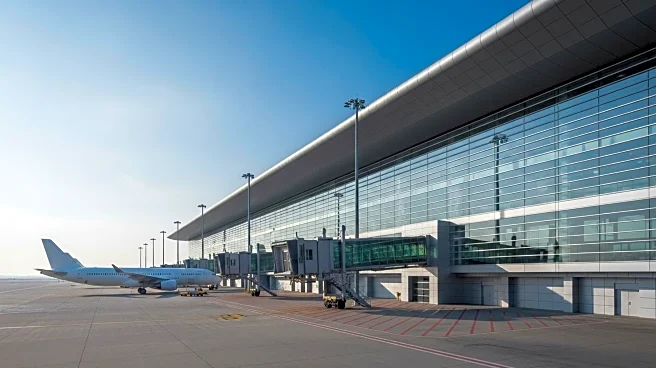What's Happening?
Prime Minister Narendra Modi inaugurated a new international airport in Mumbai, marking a significant expansion in India's aviation infrastructure. The Navi Mumbai International Airport, built by the Adani Group for an estimated $2.2 billion, is set to begin operations in December. This development aims to alleviate congestion at the Chhatrapati Shivaji Maharaj International Airport and establish Mumbai as a key passenger and cargo hub in Asia. The airport will initially operate with one terminal, with plans for four more, and is expected to handle up to 20 million passengers annually, eventually increasing to 90 million. This project is part of India's broader strategy to modernize infrastructure and enhance air connectivity, reflecting the country's growing economy and increasing air travel demand.
Why It's Important?
The inauguration of the Navi Mumbai International Airport is a pivotal moment for India's aviation sector, which has seen rapid growth over the past decade. By increasing the number of airports from 74 in 2014 to 160, the government aims to make air travel a key driver of economic growth. This expansion is crucial for improving connectivity between smaller cities and enhancing cargo movement, thereby supporting India's economic development. As the world's third-largest air transport market, India's enhanced infrastructure will likely attract more international business and tourism, boosting the economy further. The airport's strategic location and advanced facilities could position Mumbai as a major global aviation hub, benefiting various stakeholders, including airlines, businesses, and passengers.
What's Next?
The Navi Mumbai International Airport is expected to start operations in December, with further expansion plans underway. The airport will be connected by water taxis, high-speed rail, underground metro trains, and road networks, enhancing accessibility. As operations commence, stakeholders such as airlines and logistics companies will likely adjust their strategies to leverage the new infrastructure. The government may continue to invest in similar projects to further strengthen India's aviation network, potentially leading to increased foreign investment and partnerships. Monitoring the airport's impact on local and national economies will be crucial in assessing the success of India's infrastructure modernization efforts.
Beyond the Headlines
The development of the Navi Mumbai International Airport highlights India's commitment to modernizing its infrastructure and improving air connectivity. This project not only addresses immediate congestion issues but also sets the stage for long-term economic growth. The airport's integration with various transportation modes reflects a holistic approach to urban planning and development. Additionally, the involvement of the Adani Group underscores the role of private sector investment in national infrastructure projects. As India continues to expand its aviation network, the focus on sustainable and efficient infrastructure will be essential in maintaining growth and competitiveness in the global market.








